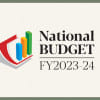How will the government arrange the money?
I must say that the budget is too ambitious in terms of size. It's 15.5 percent larger than the current FY's initial budget and 29 percent higher than the revised one. The main challenge, therefore, will be to arrange the money for the inflated budget. The government is expecting to increase its revenue by 37 percent when compared to the revised estimate of the revenue in the past fiscal year. Generally in the past several decades, the normal rate of revenue increase was between 10 to 15 percent. At best, it can be 20 percent. There is every chance of failure in the attempt to collect this huge amount of revenue with the poor capacity of the National Board of Revenue (NBR). If the revenue earning attempts fail, then budget financing would be a great problem for the government. And that will need revision of all the targets of the development sectors as well as the non-development ones. This thus may jeopardise all the priority plans of the budget which aimed to achieve the projected growth of 7.2 percent.
There is a good sign of increasing expenditure on education sector upto Tk.52,000 crore. It is much expected and obviously, we welcome this timely move. But the question on how the money will be spent still remains.
The government initially proposed a universal 15 percent VAT rate. The business community argued against this initiative, stating that as small and medium entrepreneurs do not have sales record, how will they be able to calculate the proposed VAT. Though the government has backed out from the original plan, I think it should have taken a discriminatory stand in this regard. It should have gone for a lump sum tax for the small and medium enterprises. But the proposed 15 percent VAT should be imposed on the big entrepreneurs, as they can afford it.
I was not surprised to see that the budget for public security and police sector has been increased by 54 percent. If you compare the general rate of growth of the budget, which is 17 percent, then the government is obviously giving excessive importance to this sector. But this expenditure on public security is still acceptable.
M.M. Akash is a professor at the Department of Economics,
University of Dhaka.

 For all latest news, follow The Daily Star's Google News channel.
For all latest news, follow The Daily Star's Google News channel. 








Comments